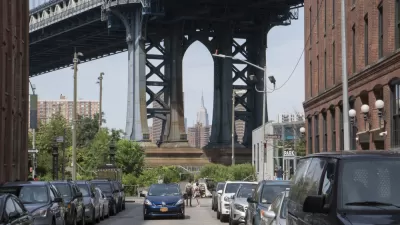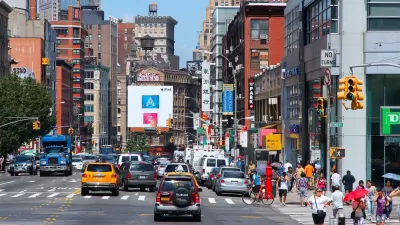In the old days, every taxi driver in New York City was required to prove at least a basic working knowledge of the city's streets and landmarks. A new licensing exam does away with geography, assuming that taxis will rely on GPS.

For many years, the New York City taxi licensing exam include up to 80 questions requiring aspiring cabbies to prove that they can navigate one of the world's largest, most complicated street systems. On the newest version of the exam, though, geographic knowledge has taken a back seat.
City officials say that the taxi industry is just keeping up with the times, since many cabbies use GPS and wayfinding apps. Some speculate, though, that the exam had to become easier in order to compete with drivers who would otherwise drive for services like Uber and Lyft, which have relatively minimal licensing requirements. Pass rates on the new exam have increased 20 percent over the old exam.
Whether New York's famously demanding passengers will stand for a professional driver who has to consult a map remains an open question.
"You can’t lower the bar so much that new drivers don’t know where they’re going,” one New Yorker told the New York Times. “When you don’t know the city, it’s a big disadvantage. If this means new drivers aren’t going to know where Radio City Music Hall is, that’s unforgivable."
FULL STORY: In New Exam for Cabbies, Knowledge of Streets Takes a Back Seat

Planetizen Federal Action Tracker
A weekly monitor of how Trump’s orders and actions are impacting planners and planning in America.

Maui's Vacation Rental Debate Turns Ugly
Verbal attacks, misinformation campaigns and fistfights plague a high-stakes debate to convert thousands of vacation rentals into long-term housing.

Restaurant Patios Were a Pandemic Win — Why Were They so Hard to Keep?
Social distancing requirements and changes in travel patterns prompted cities to pilot new uses for street and sidewalk space. Then it got complicated.

In California Battle of Housing vs. Environment, Housing Just Won
A new state law significantly limits the power of CEQA, an environmental review law that served as a powerful tool for blocking new development.

Boulder Eliminates Parking Minimums Citywide
Officials estimate the cost of building a single underground parking space at up to $100,000.

Orange County, Florida Adopts Largest US “Sprawl Repair” Code
The ‘Orange Code’ seeks to rectify decades of sprawl-inducing, car-oriented development.
Urban Design for Planners 1: Software Tools
This six-course series explores essential urban design concepts using open source software and equips planners with the tools they need to participate fully in the urban design process.
Planning for Universal Design
Learn the tools for implementing Universal Design in planning regulations.
Heyer Gruel & Associates PA
JM Goldson LLC
Custer County Colorado
City of Camden Redevelopment Agency
City of Astoria
Transportation Research & Education Center (TREC) at Portland State University
Jefferson Parish Government
Camden Redevelopment Agency
City of Claremont





























